Have you ever wondered what it is that therapists do that enables people to feel safe enough to share their deepest secrets with a stranger? What voodoo do they use to get people to open up? Well… drumroll… they L I S T E N.
In fact, one of the very first things you learn when you start training to be a counsellor, psychotherapist, or mental health practitioner is how to ‘do’ active listening. You then keep learning and relearning it on ever deeper levels with each and every client!
Of course, listening is not all a therapist does, but it’s a pretty key ingredient and one that anybody at all can learn how to do. Now you might be wondering, “Why on earth would I need to learn how to listen – I do that all the time!” And maybe you are a great listener already, although most people seem to be much better at hearing than they are at listening. I think it’s important to make a distinction between the two because not only are they very different, but they also get very different results in the world.
Hearing is mostly a passive, biological act. The way your brain makes sense of sound-waves smashing into your eardrums. Listening, on the other hand, is not really something you do with your ears, but something you do with your soul. It is an active decision, hence the term ‘active listening’. It is a choice, a skill, and something that you get better at with practice.
So why bother learning how to listen like a therapist? Because it is the best thing you will ever do for your relationships! And I mean ALL your relationships. Want to have a strong connection with your kids? Want to maintain a deep and healthy relationship with your partner? Want to get on better with coworkers? Developing deep listening skills will make a huge difference.
So… where do you start?
When learning a new skill (or improving an existing one), it can be easier to think about what not to do. What is getting in the way of deep listening in your current relationships? What are the barriers that might be leading to feelings of disconnection or distance with loved ones? Why won’t they open up to you?!
Top 5 Barriers to Listening
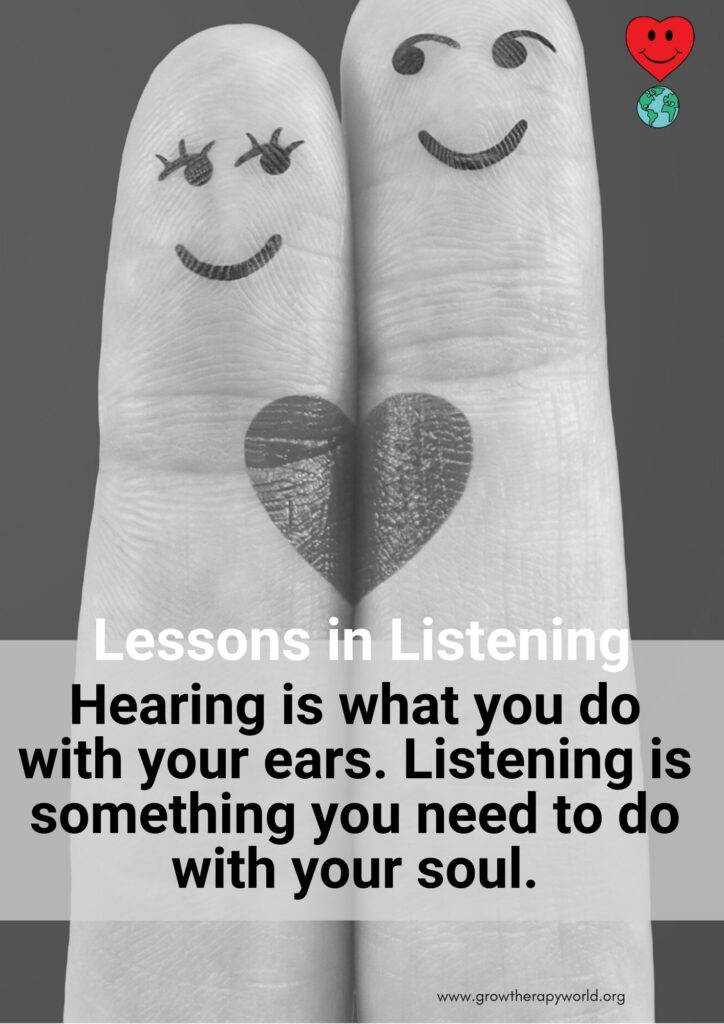
I’ve listed the barriers to listening in order of difficulty, so start at the top and give yourself time to practice breaking down one barrier before heading on to the next. Remember, therapists spend years learning how to listen like a therapist so be gentle with yourself! Just beginning to notice what gets in the way for you is important progress and the first step in listening better.
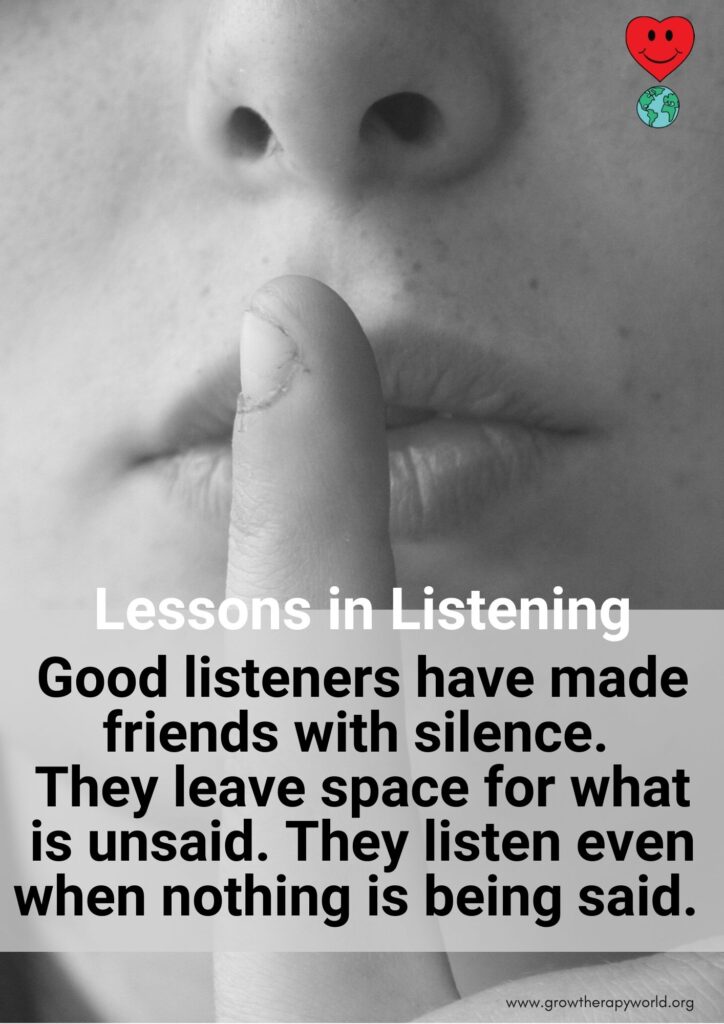
Barrier #1:
TALKING
If you want to be a good listener then you need to stop talking. So obvious right?! Simple to do? Nope! This is why being quiet is the very first thing you learn when training to be a counsellor or therapist – it is simultaneously the easiest and the hardest thing in the world to make space for another person. Silence not only leaves space for the other person to talk, but it also allows space for thoughts, feelings, sensations, and murky understandings to take shape.
Next time you are listening to someone and want to connect deeply with them, let silences be. Whenever you get uncomfortable and feel like filling the space with words think to yourself “W.A.I.T.” = why am I talking?
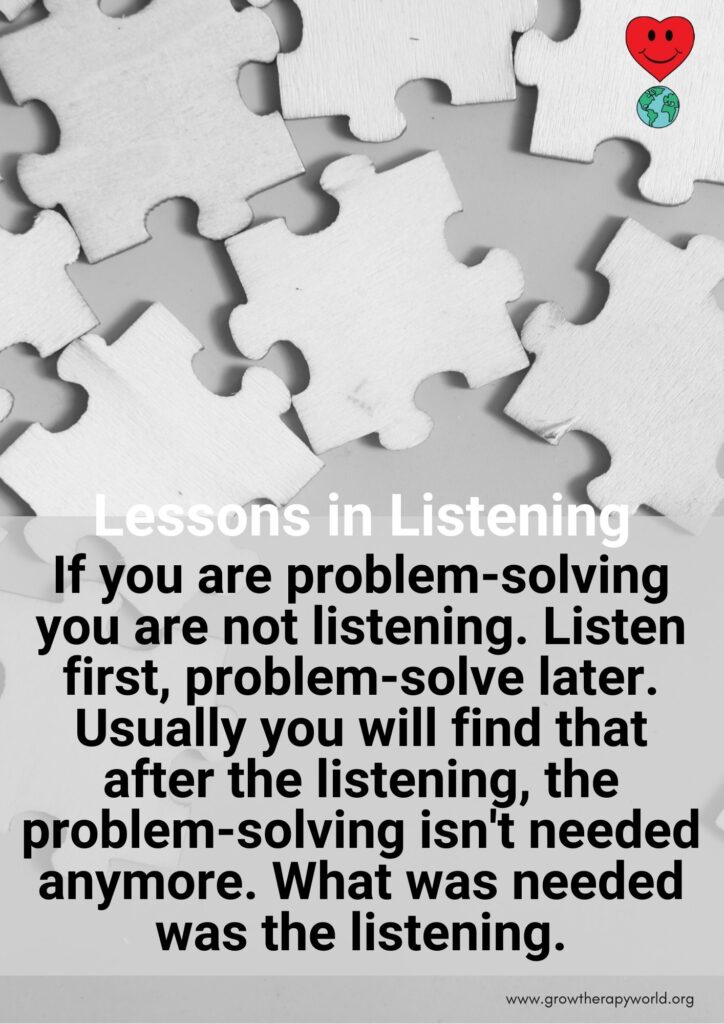
Barrier #2:
PROBLEM SOLVING
One of the reasons people struggle so much with silence and not talking is because the urge to ‘fix’ someone’s problem can be so overwhelming. It is so much easier to launch into action-ready rescue-mode than to ‘feel into’ someone’s distress and sit with it for a while. Rarely does this ‘fixing’ bring relief because when someone shares their distress with you what helps the most is a feeling of connection and validation; the sense that they are not in it alone.
If you find yourself about to say the words “you should”, “you could”, or “I would” – ask a question instead. And then empathise with the answer. You’d be surprised at how able even the youngest humans are at resolving their own problems with a bit of space and connection!
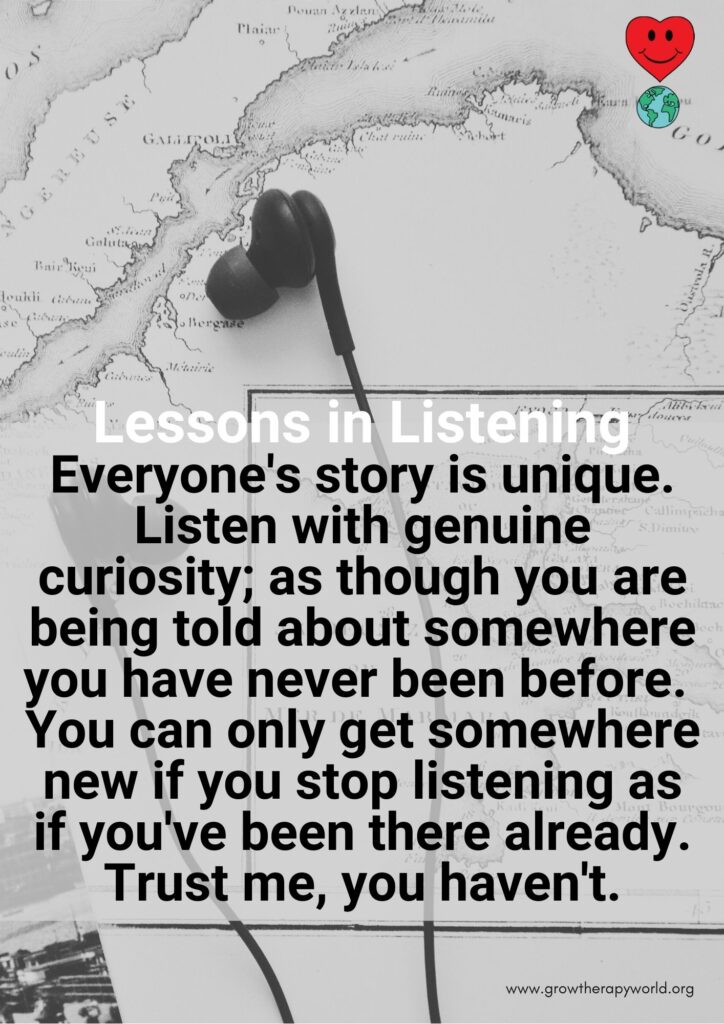
Barrier #3:
ASSUMING
In order to really be able to connect with someone you have to be genuinely curious about their story. Unfortunately, we so often listen to each other as if we already know what is going to be said, how the other person feels, and what we are going to say in response. Not only does this mean that we miss out on really hearing and understanding the other person’s experience, it also comes across in our way of responding as disinterested, judgemental, and patronising.
Do you want to share your feelings with someone who seems disinterested, judgemental, and patronising? Of course you don’t, and neither does anyone else. Next time someone is talking, try being genuinely curious about their experience.
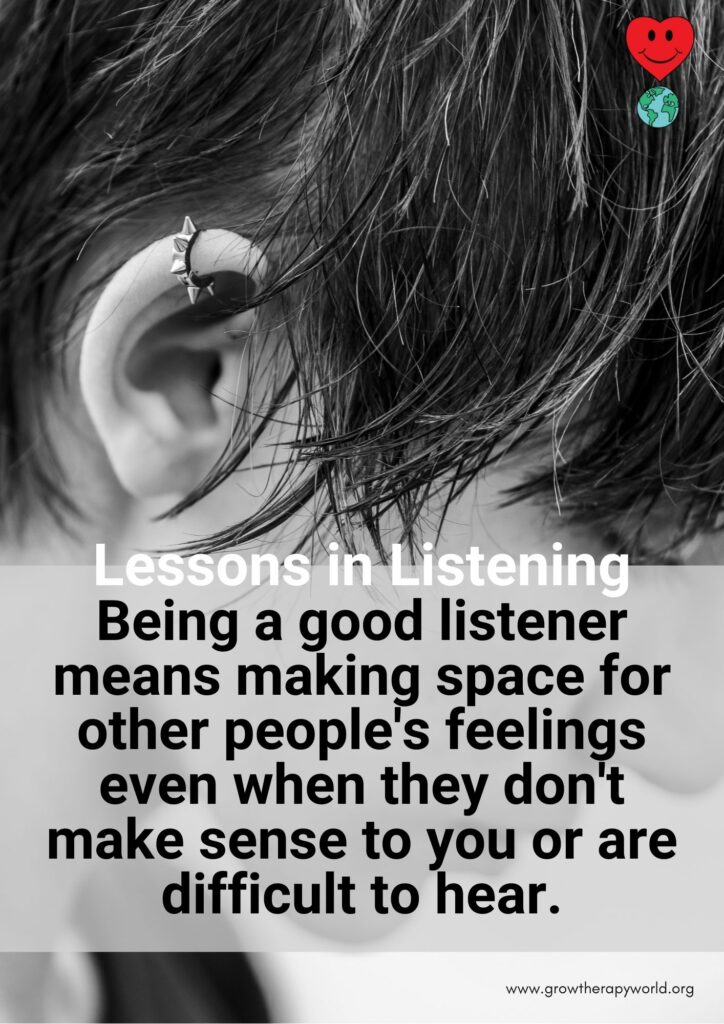
Barrier #4:
DEFENDING
To be really good at listening to others you have to get really good at listening to yourself. Otherwise, you risk letting your own baggage get in the way of hearing someone else’s story. It is very difficult to respond with kindness and compassion when you are feeling triggered or attacked yourself – especially if you are not even aware that your own gremlins have entered the room!
Inevitably at some point, someone will share something with you that is difficult to hear. Maybe it is about you. Maybe it reminds you of something difficult. Maybe you don’t even know why but suddenly you feel vulnerable or like you need to defend yourself. When you are able to notice this happening you are able to make a conscious choice – will you choose to defend, attack, or CONNECT?
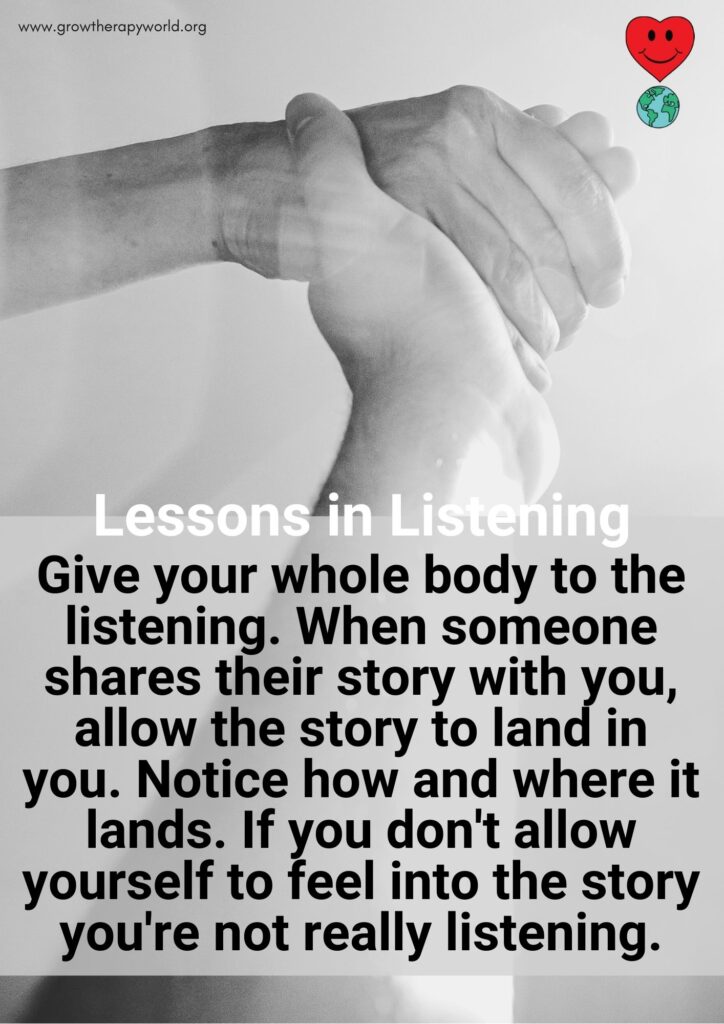
Barrier #5:
INTELLECTUALISING
It is a commonly stated fact that only 7% of communication is the actual words we speak, the rest is body language and non-verbals like volume and tone. That’s why when we listen just with our intellect we can easily miss the multiple layers of what is being communicated.
Our bodies are excellent listening machines, but we rarely pay much attention to the information they receive. It is often easier to ignore the tightness in our tummy when someone speaks about their worries, or the dull ache in our heart when someone speaks about a loss. But in order to really listen deeply we need to be able to receive and make space for more than just the words being spoken.
Listening with you whole body instead of just your thinking brain is about more than paying attention to someone’s body language or tone. In a way, it is not about tuning into their bodies but about tuning into your own. Your ability to ‘be with’ what comes up for you is what makes your ability to ‘be with’ the other person possible. They will feel the difference!
This is why noticing when barriers to listening come up for you is the first and most important step of listening like a therapist. Because ultimately, learning to listen deeply to others is about learning to listen deeply to yourself.
Is the silence making you feel anxious and uncomfortable? Great, you noticed that! You just became a better listener. Do you want to fix the problem so bad? You know exactly what they should do to make it all better and it’s so hard to stop from giving advice? Great noticing! You just became a better listener.
You are well on your way 🙂
Want some helpful reminders? You can download all the Lessons in Listening images and quotes as a set of posters for your wall for FREE.

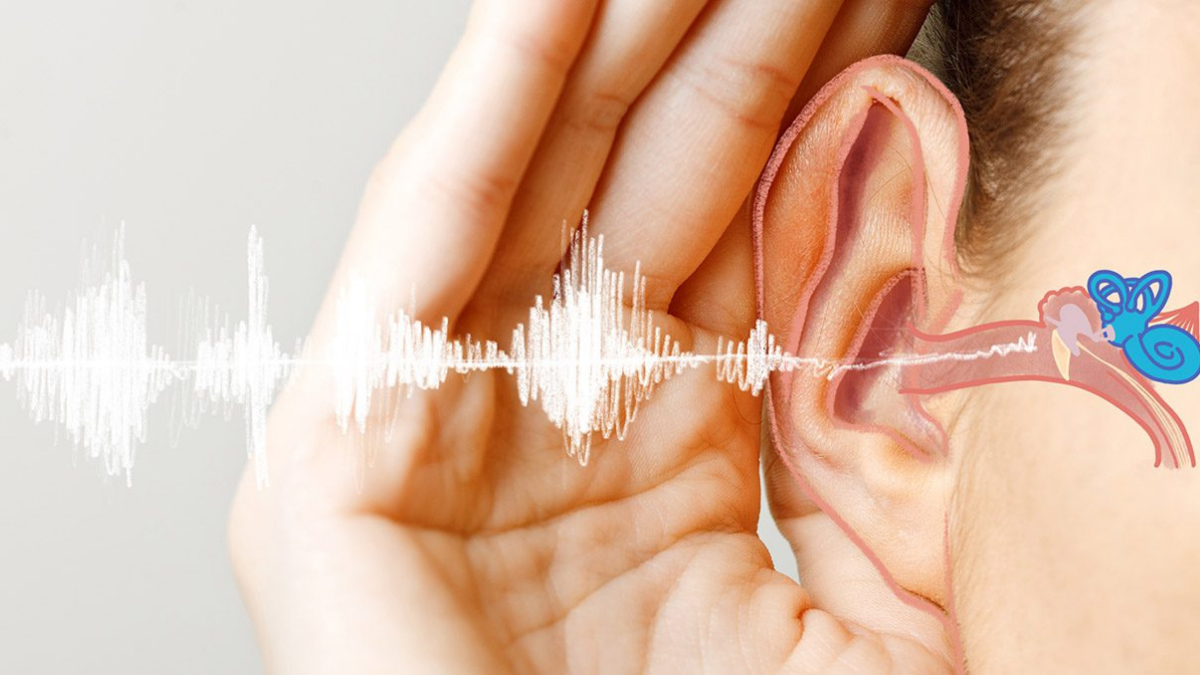
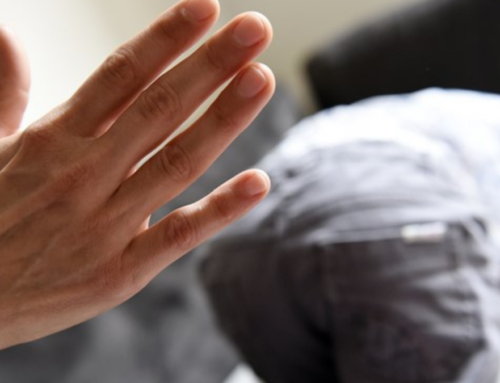
Very good and simply written. Now to apply what I practised before and am not so good at now. Thank you.
I’m just a regular person with some curiosity about psychotherapy. I want to be better at listening and helping people even if I’m not a professional therapist. This has helped me more understand about how to listen and how to help someone I’m need
I’m so glad to hear the post was helpful to you. I think if everyone in the world learned some listening skills there would be much less need for psychotherapists!
Was listening not being taught during the 1980s and ’90s? A therapist that I dealt with back then suddenly looked at me, and said “I get the impression that you hate yourself.” I had only been telling him that in every session, in those words, for the last two years. Similar experiences with five other therapists left me disgruntled with the whole profession.
I’m sorry to hear that your experience with therapists has been less than positive 🙁 Finding a therapist that is the ‘right fit’ for you is a life-changing experience but unfortunately, that doesn’t always happen and can put people off seeking help in the future.